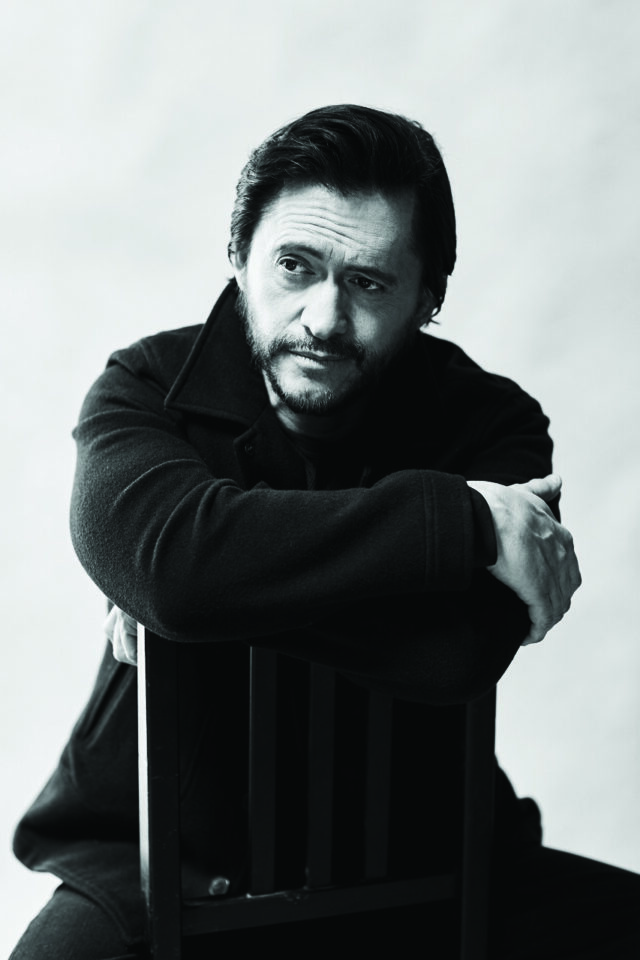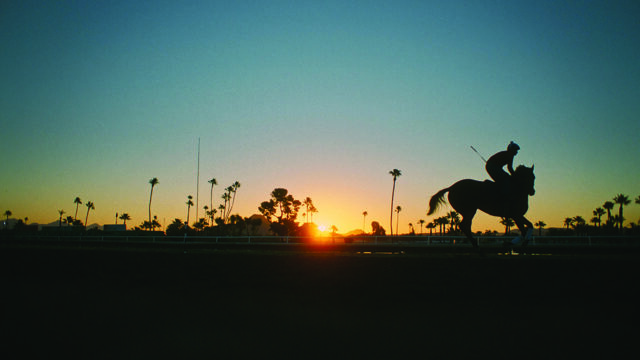
By Steve Garbarino
Why the long face? According to actor Clifton Collins Jr., the thoroughbred horses in Jockey, which won him Best Actor at the 2021 Sundance Film Festival, were groomed, fed and bedded more accommodatingly than the twee-sized cast and crew of the Clint Bentley-directed independent picture, premiering on the East Coast at this year’s Hamptons International Film Festival. “We had a crew of 10, no hair, no makeup, none of that,” he says with a degree of pride. The film utilizes sunrises and sunsets in a way that should nab cinematography awards. Simple: dusk to dawn, all in a day’s work, economical ingenuity.
Yet the 51-year-old Screen Actors Guild-winning co-star of films such as Capote (he portrayed serial killer Perry Smith) and Traffic, and TV shows such as Westworld, would not have had it any other way. “I told my agent I would block his calls if he didn’t let me do this part,” he says. “I didn’t care if my house burned down, I’m doing it,” says Collins, who is single. “I was engaged once, then, un-engaged.” He lives with his puppy, an Australian blue heeler, “like the one in Mad Max,” he says.
Inspired by his childhood riding western—Collins’s grandfather rode the saddle as an actor with John Wayne—he passionately wanted the job playing a veteran stakes-winner questioning his skills and his ravaged body, and an up-and-coming jockey rookie who claims to be his illegitimate son.
“My Dad used to take me to the race track, Hollywood Park,” says Collins, who grew up in Los Angeles. “We’d stop at the liquor store, he’d get his brown bag, and then bid on the horses.” His grandfather, Pedro González González, was a contestant on Groucho Marx’s You Bet Your Life. John Wayne culled him in after watching him on the quiz show, and it led to countless Western spots.
The Jockey drama, which has received rave advance reviews, has been compared to The Wrestler, starring Mickey Rourke as an aging grappler. It blows open the stables on what the day-to-day world of a professional jockey is really like. Unlike glamorized equestrian-based films, it is a dulling and strenuous kick in the head. To authenticate that world, the movie used real-life pro jockeys as actors. Collins picked up their vernacular, and dispelled a few misconceptions.

Though he is 5-foot-9, more inches than is typical of a championship jockey, he says that, for one, some of them were taller than him. “Some are in their 70s. There is a brotherhood in the fold, but there is fierce competition.
“I learned a lot by example,” he says. “I didn’t want to be an actor-y guy to them. I didn’t officially ask questions. I just took in their language and manners, taking notes whenever possible. Like most professional athletes, the older jockeys are more respectful. The younger ones are more cocky, mouthier.”
He related to the fact that jockeys, he says, “run on adrenaline. And there is a relationship to the jockey and the horse that owners don’t have. It’s much more intimate. If a jockey got wind that an owner and his crew were doping a horse, they’d be livid. They are very protective of the horses. It is a beautiful thing to witness.”
In terms of his diet, he took cues from the real jockeys. “Some would stop eating anything more than a couple almonds at a time before a race to keep their weight down, lighten the load. I’d eat some peanuts or M&M’s, and they were delicious. I’d stop eating before 1PM. And I had my plastic sweat suit that makes you sweat like wrestlers do to make their class.”
He came to love horses—“beautiful, fierce, powerful,” he describes them. Collins really got his saddle on for Westworld, not that you’d have seen it. “I rode like a champ, but I was too good. It didn’t seem real. Most couldn’t be used because it was truly crazy. I was jumping big cactus trees. I survived but would happily do it again!”
Collins is not Hollywood progeny, despite his grandfather’s cinematic moments. “I grew up in Culver City. I was the class clown,” he says. “Taught by Jesuits in a private school. My parents divorced when I was 6. I did detention a lot. Learned how to tap dance when I was 7. I ran away when I was 16. I was blessed to have older friends, who were biker gang members.”
Post-filming, which was shot at real tracks in Arizona, Collins says that what has stayed with him is a regimented diet, and a strong bond with wild animals.
“I don’t eat after 6PM. I can’t do 7:30. I have things like a salad with chicken. I was 143 pounds for the film, 154 now. My doctor is thrilled with my health.”
And…he’s….off.
Jockey screens at the Hamptons International Film Festival on October 9





